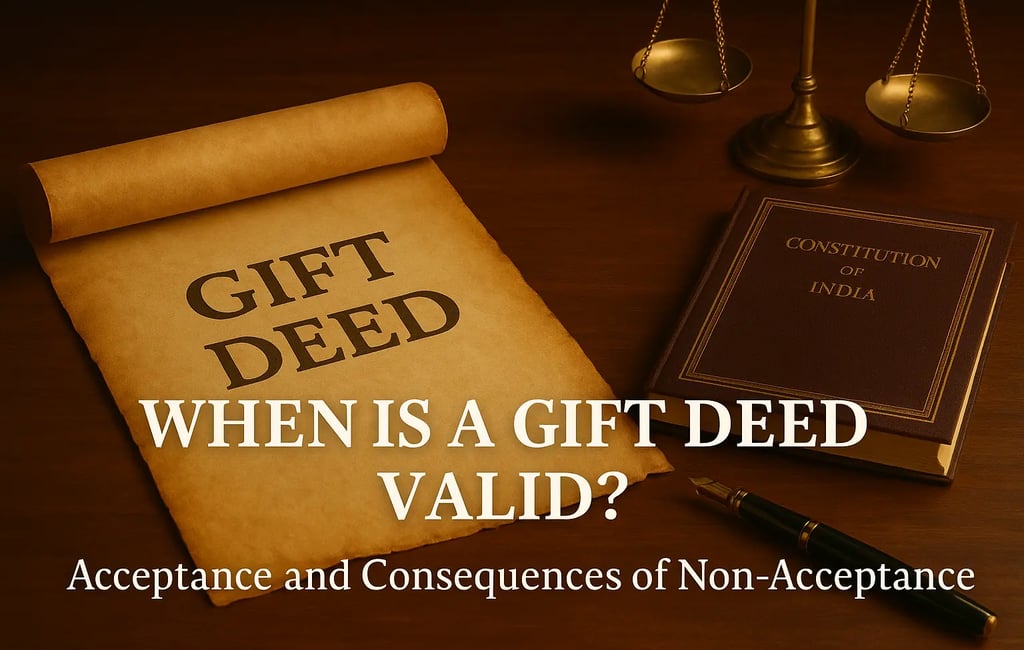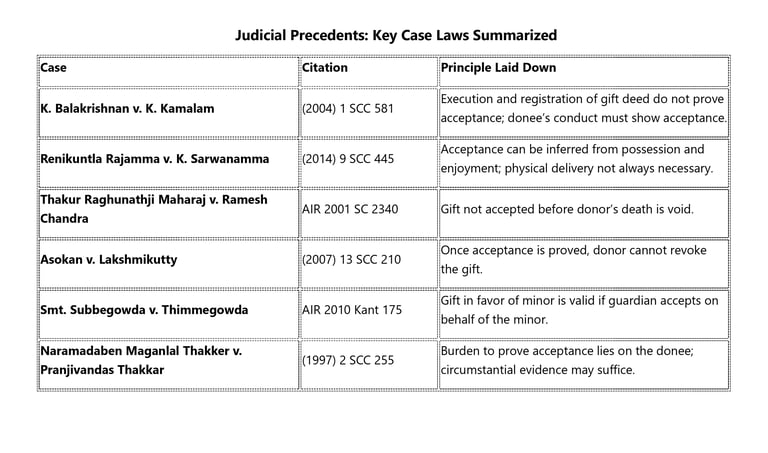When does a Gift Deed becomes Valid? Acceptance and Consequences of Non-Acceptance in India..
Know when a gift deed becomes valid under Indian law. Explore modes of acceptance, timing, and consequences of non-acceptance with key case laws.
Author - THelawcritiQue
10/5/20258 min read


Gift Deed in India: Modes of Acceptance and Consequences of Non-Acceptance (with Important Case Laws)
Introduction
The mode of transfer of property by way of a gift deed is one of the most significant transfers since it is an onerous one without consideration. Therefore, a gift deed is one of the most common modes of transfer of property in India, especially within families. The term gift is defined under Section 122 of the Transfer of Property Act, 1882, as “gift” is defined as the transfer of certain existing movable or immovable property, made voluntarily and without consideration, by one person (the donor) to another (the donee), and accepted by or on behalf of the donee.
The provision not just provided the necessity of 'transfer - execution', 'without consideration' for a gift, but equally mandated the importance of 'acceptance by or on behalf of the donee'. While most people focus on the execution and registration of a gift deed, the concept of acceptance is equally crucial. In India, the transfer does not take effect at all unless the donee accepts the gift deed during the lifetime of the donor. Without a proper acceptance, it will be considered no gift deed at all.
This post explains how acceptance of a gift deed works, the modes of Acceptance of a Gift deed, and the legal consequences of Non-Acceptance of a gift deed, with reference to landmark judgments from Indian courts.
Understanding a Gift Deed: Key Legal Ingredients
Chapter VII of the Transfer of Property Act, 1882, containing sections 122 - 129 enshrine the the following requirements for a valid and complete execution of a gift deed.
Transfer of existing property – The subject matter of the property must existing at the time of the gift; future property cannot be gifted.
Ownership of donor – The donor must be complete owner of the property with absolute and existing title. A joint owner can gift only to the share he is entitled in the joint property. Moreover the owner must be competent own property.
Voluntary transfer – Free consent as given under the Indian Contract is also equally applicable to gift. A free consent is a voluntary agreement made without force, coercion, or undue influence.
Without consideration – The most important ingredient of a Gift deed is that it shall not be supported by consideration. Gifts are transfers made out of love and affection, not for monetary gain.
Registration – Gift of an immovable property, as mentioned under Section 123 of Transfer of Property Act, cannot confer any rights or impose obligations unless it is registered as per the provisions of Section 17 of the Registration Act, 1908.
Acceptance by donee – Further most important ingredient to make the Gift deed a complete document is that the gift shall be accepted by the donee during the lifetime of the donor and while the donor is capable of giving.
Modes of Acceptance of a Gift Deed
While the Act made the Acceptance of a gift deed mandatory, it did not define how and acceptance can be made or what facts confer a valid acceptance of a gift deed by the donee. But there are two important modes of acceptance as recognized by the Indian Judiciary based on the circumstances warranting its necessity. An acceptance can either be express or implied.
1. Express Acceptance
Express acceptance is the mode of acceptance by which the donee expressly and explicitly acknowledges the transaction by an act of acceptance like signing or declaration. An act which signifies the or expresses the intention that the donee acknowledges the gift transaction made in his favour is nothing express acceptance. — for example:
A donee can sign the gift deed itself confirming his acceptance of the recitals of the deed, thereby lawfully accepting the gifted property;
Though not as a party to the gift deed directly, the donee can execute a declaration separately to express his acceptance formally known as - 'declaration of acceptance'; or
Through a recorded instrument in writing such as a letter, statement or formal agreement the donee can express his acceptance..
Example:
If a father gifts a property in favour of his daughter and in return she acknowledges it through a declaration in writing stating that she formally accepts the gift donated by her father - it amounts to express acceptance.
2. Implied Acceptance
Though there is no express written or verbal acceptance, the acceptance of a gift deed can also be made by conduct of the donee. When the donee’s conduct is so apparent that it indicates acceptance, even without verbal or written words, it is called implied acceptance. Implied acceptance can be drawn in the following instances-
When the donee takes possession of the property gifted it can be presumed that the donee accepted the gift deed;
Taking the income received or enjoying the benefits arising from the property;
When the donee voluntarily pays property tax, makes mutations, or started constructing upon the land gifted in the document;
Any other conduct by the donee that clearly indicates the his intention to accept the gift.
Implied acceptance is often inferred from circumstantial evidence rather than direct evidence for example, — when a donee continues to live in or manage the property after execution.
Renikuntla Rajamma v. K. Sarwanamma, (2014) 9 SCC 445
The Supreme Court held that acceptance can be inferred from circumstances, such as continued possession or enjoyment of property, but there must be clear evidence that the donee accepted the gift during the donor’s lifetime.
3. Acceptance by Guardian (When Donee is a Minor)
A minor is considered incompetent person to enter into a contractual obligation under Indian Law. But a minor can be a donee under a gift deed and receive the benefits arising out of a gift deed under certain cases where
The gift is created for the benefit of the minor. A minor cannot gift property against his interest, and
Though minor cannot accept the gift, the gift shall be accepted by the natural guardian or legal representative.
Illustration:
When a grandfather gifts property to his minor grandson, it shall be accepted by the natural guardian i.e., mother or father on behalf of the child. If the guardian rejects it, the gift fails.
Smt. Subbegowda v. Thimmegowda, AIR 2010 Kant 175 — A gift in favor of a minor is valid and it can be accepted by a guardian or legal representative for the minor’s benefit.
Legal Requirement: Timing of Acceptance
The timing of acceptance is also important when the fact of acceptance comes in question. Section 122 clearly states that acceptance must occur during the lifetime of the donor and while the donor is still capable of giving.
Hence, if:
The donor dies before acceptance, or
The donee dies before acceptance,
then the gift becomes void ab initio — as if it was never executed.
Consequences of Non-Acceptance
Section 122 of the Transfer of Property Act, 1882 Failure to prove acceptance is fatal to a gift. Even a registered gift deed does not create ownership unless acceptance is proved.
1. Gift Deed Becomes Incomplete and Void
Acceptance is the most important prerequisite of a gift deed that non acceptance of it before the donor dies, the gift deed has no legal effect. Such gift deed becomes void ab initio and ownership under such deed never passes.
K. Balakrishnan v. K. Kamalam, (2004) 1 SCC 581
The Supreme Court held that mere execution and registration of a gift deed do not constitute a valid gift unless acceptance by the donee is proved. It has also held that a natural guardian can accept the gift deed on behalf of the minor and once accepted it becomes irrevocable.
2. Gift Can Be Revoked Before Acceptance
A gift if not accepted by the donee is revocable by the donor himself. Once accepted, it becomes irrevocable and cannot normally be revoked unless in cases under Section 126 on a mutual condition. Hence, until acceptance, the donor retains full control and may cancel the gift deed.
Asokan v. Lakshmikutty & Ors. (2007) 13 SCC 210
it was held that - “A gift is not complete without acceptance. Acceptance must be made during the lifetime of the donor and while the donor is still capable of giving. If the gift is not accepted during that period, it is incomplete and revocable.”
3. Burden of Proof Lies on the Donee
The fact that the donee has accepted the gift deed is always upon his intentions and actions. It is always the donee’s responsibility to prove acceptance. Mere registration of a gift deed or subsequent possession of the property by the donor does not shift the ownership unless the donee has clear intention to and shows conduct indicating acceptance.
4. Non-Acceptance Makes Mutation Entries Invalid
A non-acceptance renders the gift deed itself ineffective. Therefore, any Revenue or municipal records updated or mutated based on an unaccepted gift deed have no legal force. The donee cannot claim ownership or transfer the property further.
Practical Steps to Ensure a Valid Gift
Step 1: Execute a Written and Registered Gift Deed
It is important to use clear and concise language stating voluntary transfer without consideration.
Describe the schedule of the property in detail with accurate boundaries and survey numbers and get it registered by paying proper stamp duty under the Registration Act, 1908.
Step 2: Include a Clause on Acceptance
In order to avoid all the legal complications of proof of acceptance, make sure that the deed explicitly mentions that the donee has accepted the gift during the donor’s lifetime.
Step 3: Document Evidence of Acceptance
A deed of declaration of acceptance can be executed to prove express acceptance. Also recording the handover of possession or symbolic delivery may further strengthen.
Add donee’s signature as a party confirming the recitals of the gift deed.
Alternatively one can also obtain acknowledgment of acceptance in writing or affidavit.
Step 4: Update Property Records
After registration and acceptance, update municipal or revenue records to show ownership change and conduct of the donee in furtherance to acceptance.
Our CritiQue : Controversies
Since the law has intentionally left the mode of acceptance and did not prefer any factual or legal necessities on what confers a valid acceptance, it was left for the courts to decide whether the gift deed was accepted upon or not in every case. There is a wide ambiguity on what confers acceptance. Judicial precedents also differ on what constitutes sufficient acceptance. Some hold possession as enough, others require overt acts.
In a country like India, where gifts between family members, have emotional factors often obscure legal formalities — creating ambiguity. Particularly after the donor dies, every gift property is subjected to a legal dispute owing to the ambiguity surrounding the acceptance of the gift deed. This has lead to the partition and legal issues regarding the validity of the gift deed where the intention of the donor and the conduct of the donee have prime importance.
Conclusion
Acceptance is the soul of a gift deed. No matter how perfectly executed or registered a gift is, it becomes meaningless unless the donee accepts it during the donor’s lifetime. Courts consistently uphold that ownership transfers only upon clear evidence of acceptance, whether express or implied.
To avoid disputes, it is always suggested that every gift deed should record acceptance explicitly, supported by documentary or circumstantial proof. It is not just a matter of formality — it’s the thin line between a valid gift and a void transaction.
Also check : An instrument needs to be duly ‘Attested’.. what confers valid attestation to know about the attestation of the deed and legal complications involved therein.
Frequently Asked Questions (FAQs)
1. What is a gift deed under Indian law?
A gift deed is a type of transfer of property through which a person (the donor) voluntarily transfers ownership of property to another person (the donee) without any monetary consideration. It must be executed in writing and registered under the Registration Act, 1908.
2. When does a gift deed become valid?
A gift deed becomes valid only after the donee accepts the gift during the donor’s lifetime and while the donor is capable of giving.
3. How can a gift deed be accepted?
Acceptance may be express (donee signs or acknowledges the gift) or implied (donee implies acceptance through his conduct and actions).
4. What happens if a gift deed is not accepted?
If a gift deed is not accepted, the transfer is void and no ownership will be passed to the donee. The donor remains the owner, and the gift can even be revoked before acceptance.
5. Can a gift in favor of a minor be valid?
Yes. A minor can receive a gift if it is accepted by a guardian on their behalf and is beneficial to the minor. However, if the guardian rejects it, the gift fails.
Further Reading : Live-in Relationships in India: Legal Rights, Case Laws & Social Stigma -- to know about the present day trends regarding the Live-in Relationships and the Legal interpretations..


Connect With Us Through
Connect with us
© 2025. All rights reserved.
